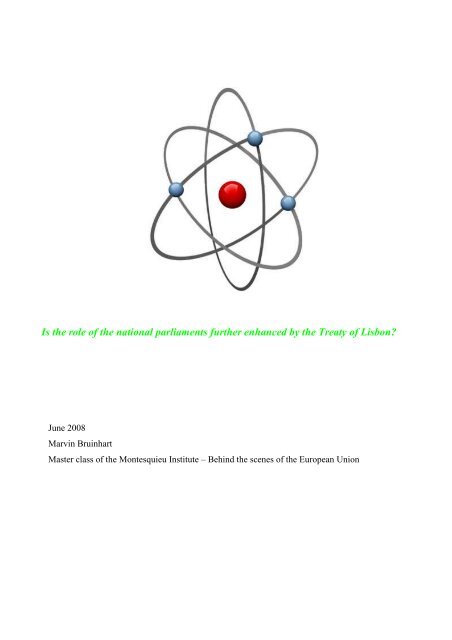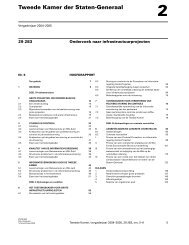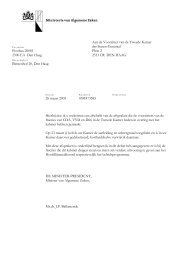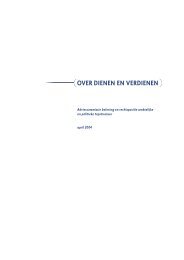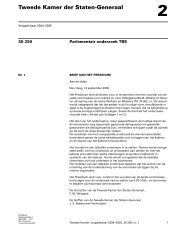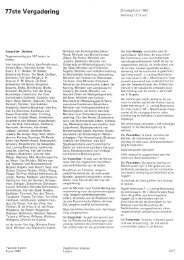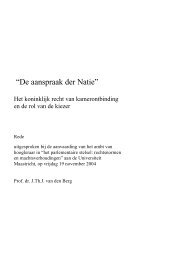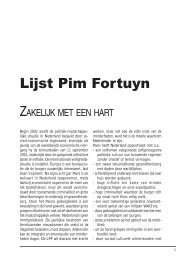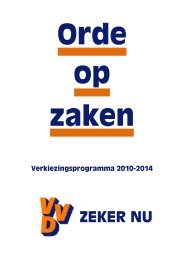Paper Marvin Bruinhart PDF
Paper Marvin Bruinhart PDF
Paper Marvin Bruinhart PDF
You also want an ePaper? Increase the reach of your titles
YUMPU automatically turns print PDFs into web optimized ePapers that Google loves.
Is the role of the national parliaments further enhanced by the Treaty of Lisbon?<br />
June 2008<br />
<strong>Marvin</strong> <strong>Bruinhart</strong><br />
Master class of the Montesquieu Institute – Behind the scenes of the European Union
TABLE OF CONTENTS<br />
TABLE OF CONTENTS 2<br />
ABBREVIATIONS 4<br />
PREFACE 5<br />
CHAPTER 1<br />
The question at hand 6<br />
CHAPTER 2<br />
What is the current role of the European Parliament and the national parliaments? 8<br />
2.1 Overview 8<br />
2.2 Democratic deficit 8<br />
2.2.1 European Commission 9<br />
2.2.2 European Parliament 10<br />
2.2.3 National parliaments 11<br />
CHAPTER 3<br />
What solutions does the Treaty of Lisbon offer? 13<br />
3.1 Draft Treaty on a Constitution for Europe 13<br />
3.2 Treaty of Lisbon 13<br />
3.3 Improvement Treaty of Lisbon over Draft Treaty on a Constitution for Europe? 14<br />
3.3.1 Improvement European Commission under the Treaty of Lisbon? 15<br />
3.3.2 Improvement European Parliament under the Treaty of Lisbon? 15<br />
3.3.3 Improvement national parliaments under the Treaty of Lisbon? 15<br />
2
CONCLUSIONS 17<br />
BIBLIOGRAPHY 18<br />
Literature 18<br />
Websites 19<br />
Treaties 20<br />
3
ABBREVIATIONS<br />
EP<br />
EU<br />
MEP<br />
NATO<br />
WTO<br />
UN<br />
European Parliament<br />
European Union<br />
Members of European Parliament<br />
North Atlantic Treaty Organization<br />
World Trade Organization<br />
United Nations<br />
4
PREFACE<br />
First and foremost I would like to express my gratitude to the Montesquieu Institute for the<br />
opportunity to participate in the master class Behind the scenes of the European Union.<br />
Furthermore, I would also like to thank all lecturers present during seminars of the master class.<br />
In particular I would like to express my gratitude to Dr. Mr. Philipp Kiiver, Professor European<br />
and Comparative Constitutional Law at Maastricht University and Drs. Tom J.A.M. de Bruijn, at<br />
the time of writing the Dutch Permanent Representative in Brussels.<br />
5
CHAPTER 1<br />
THE QUESTION AT HAND<br />
Charles Louis de Secondat, baron de La Brède et de Montesquieu was a French political<br />
philosopher, well-known for his theory of separation of powers, otherwise known as the trias<br />
politicas, This separation of the legislative, executive, and judicial functions of government is<br />
implemented in many constitutions worldwide.<br />
It is this Charles Montesquieu that the Montesquieu Institute derives its name from.<br />
On Friday the 7 th of March 2008 the Montesquieu Institute started its first master class,<br />
consisting of a series of seven seminars.<br />
Throughout the seven seminars the European Union was highlighted from the historical,<br />
political, social and economic perspective.<br />
The second seminar, concerning the role of national parliaments in the decision-making in the<br />
European Union, took place on Friday the 28 th of March 2008.<br />
During this seminar Dr. Mr. Philipp Kiiver, Professor European and Comparative Constitutional<br />
Law at Maastricht University, gave an insight into the legal relations between the European<br />
Union and the national institutions.<br />
Kiiver was followed by Drs. Tom J.A.M. de Bruijn, at the time of writing the Dutch Permanent<br />
Representative in Brussels, who spoke from first hand experience on decision-making in<br />
Brussels.<br />
This essay draws into focus aforementioned relations between the European Union and National<br />
Institutions.<br />
6
I believe the current state of the legislative process in the European Union justifies this essay as<br />
it aims to answer the following central question.<br />
Is the role of the national parliaments further enhanced by the Treaty of Lisbon?<br />
The first chapter of this essay will give a more elaborated insight into the question at hand and<br />
will provide a historical overview of legal relations between the European Union and the national<br />
parliaments.<br />
Moreover, the below listed sub-questions have proven to be of paramount importance in<br />
answering the central question.<br />
The second chapter aims to answer the first sub-question, which is:<br />
What is the current role of the national parliaments?<br />
Subsequently the third chapter will answer the last sub-question, which is:<br />
What solutions does the Treaty of Lisbon offer national parliaments?<br />
These three chapter are followed by the conclusions drawn.<br />
7
CHAPTER 2<br />
WHAT IS THE CURRENT ROLE OF THE EUROPEAN UNION AND THE NATIONAL PARLIAMENTS?<br />
2.1 Overview<br />
Because yet another war on such an enormous scale as the First and Second World War was to<br />
be avoided at any and all cost, the founding members of the European Union decided to link their<br />
futures (Nicoll, Salmon, 2001, p.9). Determined to keep a common identifiable enemy (seen in<br />
the Soviet Union) at bay, the six founding members of the European Union, Belgium, France<br />
Germany, Italy, Luxemburg and the Netherlands, decided to pool their sovereignty (Tsoukalis,<br />
2003, p. 7).<br />
Perhaps at that time the European Union was seen as a necessary evil?<br />
Which ever the case, currently the European Union is viewed as an unique project. It is a mixture<br />
of an intergovernmental and supranational institution and at the moment is the most complex<br />
international body in the world. Archer (2001) argues that the competences of the European<br />
Union now cover all areas of public policy ranging from health and economic policy and to some<br />
extent to the policies of foreign affairs and defence (p. 42).<br />
Depending on the policy area, at one time the European Union closely resembles a federation,<br />
while at others it shares the traits of a confederation. At others still the Union mimics the actions<br />
of an international organization (Norman, 2003, p. 14).<br />
2.2 Democratic deficit<br />
Popular opinion seems to be that the European Union suffers from a democratic deficit, meaning<br />
that decisions in the European Union are insufficiently representative of, or accountable to, the<br />
nations and people of Europe (Cini, 2006, p. 360).<br />
8
What sets European Union apart from other international organizations, such as NATO, the UN<br />
or the WTO, which are far less democratic?<br />
The answer to this question seems to be in line with Archer’s statement and seems to be that no<br />
other international organization or international treaty affects the daily lives of European citizens<br />
in such an intrinsic manner. Moreover, no sovereignty was conferred to any of these<br />
organisations.<br />
In the organization that is the European Union, over time sovereignty was yielded by the member<br />
states to the European Union in a process called conferral (Gower, 2002, p.5). The member states<br />
of the European Union were convinced that the benefits of integration, in contrast to cooperation,<br />
outweighed what at first glance seemed to be a major disadvantage: a loss of<br />
sovereignty (Nugent, (1999, p. 24).<br />
Though the EU stands for a believe in a common destiny, it is clear that the Union would not<br />
have existed if it had not offered to potential member states the possibility of furthering their<br />
national interests. The EU would not have existed if it had not offered to potential member states<br />
the possibility of furthering their national interests (Nugent, (1999, p. 24).<br />
It is this transferral of powers from the member states to the European Union has resulted in a<br />
loss of powers for the national parliaments.<br />
There are two important players in the Community law-making process.<br />
2.2.1 European Commission<br />
The first significant actor is the European Commission, which performs its duties independent of<br />
national governments. Its duties are to represent and protect the interests of the EU as a whole. It<br />
drafts proposals for new European laws, which it presents to the European Parliament and the<br />
Council of Ministers. The Commission has the right of initiative, which means that it alone has<br />
9
the power of drawing up proposals for new European legislation, which it presents to Parliament<br />
and the Council (http://europa.eu/institutions/inst/comm/index_en.htm).<br />
However, the traditional justification of the Commission’s power, that its autonomy would result<br />
in it being able to better represent the Union’s interests (Norman, 2003, p. 97).<br />
2.2.2 European Parliament<br />
The second mayor factor in Community law-making is the European Parliament. Initially<br />
consisting of appointed representatives of national parliaments, it was not until 1979 that<br />
Members of European Parliament were elected by the citizens of the European Union<br />
(http://europa.eu/institutions/inst/parliament/index_en.htm). Additionally, it was not until the<br />
Single European Act in 1986 that it was formally recognized as a parliament (Chalmers,<br />
Hadjiemmanuil, Monti, Tomkins, 2006, p. 111).<br />
Since it was first elected in 1979 the European Parliament has gradually transitioned from a body<br />
that was merely consulted into one that – in some policy areas is a force to be reckoned with as<br />
under the co-decision (http://europa.eu/scadplus/glossary/index_en.htm) has equal say with the<br />
Council of Ministers (Bale, 2005, p. 49).<br />
The concepts of democratic deficit and accountability are often confused with each other. The<br />
concept of accountability is defined as institutions having to explain what they are doing, having<br />
to make themselves politically liable and having to take responsibility for what they do.<br />
It is argued that neither the institutions being called or held to account, nor the those to whom<br />
they are accountable, need necessarily be democratic and that these concepts best be kept strictly<br />
apart (Chalmers et al, 2006, pp. 313 – 314).<br />
In the quest for democracy the signing of the Treaty of Maastricht in 1992 (hereinafter<br />
Maastricht) is considered as a serious attempt to improve the democratic nature of the European<br />
Union. It was through Maastricht that the European Parliament that the co-decision procedure<br />
was introduced allowing the Parliament to veto legislation in certain areas.<br />
10
At the time of Maastricht number of strategies were introduced, among which the introduction of<br />
new stakeholders such as the Committee of the Regions. Symbolically, to create the notion of the<br />
democratization process moving forward, the European citizenship was introduced.<br />
2.2.3 National parliaments<br />
At this moment in time the European integration motor kept grinding and more and more<br />
legislation was introduced in an increasing number of fields. And so the principle of subsidiarity<br />
was introduced, stipulating that in areas were both the member states and the European Union<br />
had competences, the Union was only to act if the objectives of the proposed action could not be<br />
achieved by the member states. Had it come into force, the Draft Treaty on a Constitution for<br />
Europe would have made national parliaments responsible for policing subsidiarity.<br />
Through the Treaty of Amsterdam in 1997 (hereinafter referred to as Amsterdam) the codecision<br />
procedure was further extended and thus granted the Parliament veto in more areas.<br />
Although Amsterdam had far more impacts, most important for the scope of this essay is that<br />
Amsterdam paid more attention to the role of national parliaments (Norman, 2003, pp. 28 – 39).<br />
The Protocol on the role of national parliaments in the European Union was added to<br />
Amsterdam, ensuring that national parliaments would receive all consultation documents, giving<br />
them time between the announcement of Commission proposals and these proposals being<br />
placed on the Commission legislative agenda.<br />
Prominent in said protocol is that the contracting recall the way in which national Parliaments<br />
scrutinise their governments in relation to the activities of the Union is a matter for the<br />
particular constitutional organisation and practice of each Member State, which is indicative of<br />
the fact national parliaments in the European Union have a history of participatory democracy<br />
that predates Amsterdam.<br />
Norman (2003) has identified two forms of parliamentary procedures which have emerged in the<br />
Member States, namely the document-based model and the mandate-based model (pp. 168 – 70).<br />
11
One of these parliamentary procedures is the document-based model, which was first adopted by<br />
the United Kingdom, and was derived from the results of a committee, which was established as<br />
early as 1972 (http://www.parliament.uk/documents/upload/l11.pdf).<br />
This example of out of the box thinking was later used by other national parliaments, among<br />
which the Dutch national parliament, the document-based approach is an evaluation of EUdocuments<br />
at the early stages of the decision-making procedure, in order to ascertain which<br />
documents require further consideration. Frequently it is accompanied by a scrutiny reserve<br />
prohibiting Ministers from agreeing to proposals in the Council of Ministers until parliamentary<br />
scrutiny has been completed.<br />
Chalmers (2006) argues that numerous difficulties have emerged as well (p. 170).<br />
Among these Chalmers has established that national governments pass on proposals too late or<br />
pass on insufficient information about proposals. Another issue established by Chalmers is that<br />
the interest of national parliaments is highly variable. It is this lack of interest that amazes me,<br />
especially against the background of the perceived loss of sovereignty.<br />
Nonetheless, this lack of interest is a reality. Even in the Netherlands, there is no general scrutiny<br />
reserve in the scrutiny system of the Senate of the Netherlands. The European Affairs Committee<br />
considers all EU-proposals that are sent to the Senate by the Netherlands’s government. The<br />
European Affairs Committee may decide to refer a proposal to further examination in a sectoral<br />
committee, who can ask questions to the government or adopt an opinion on the proposals<br />
(http://www.cosac.eu).<br />
It is interesting to see that even though national parliament have a history of in one way or the<br />
other scrutinizing EU-proposals, that at present the democracy of the Community law-making<br />
process continues to be criticized. Concerns are raised about the quality of the representative<br />
democracy, focussing on the extent to which law-making in the European Union undermines<br />
parliamentary democracy (Chalmers et al, 2006, pp. 167).<br />
This is recognized in the Laeken Declaration as it stresses the need to examine the role of<br />
national parliaments in the European integration process.<br />
12
CHAPTER 3<br />
WHAT SOLUTIONS DOES THE TREATY OF LISBON OFFER?<br />
3.1 Draft Treaty on a Constitution for Europe<br />
It was the Laeken Declaration that led to the European Convention on the Future of Europe.<br />
Consisting of 105 members, with Valéry Giscard d’Estaing as president, the Convention was<br />
given a number of questions to answer, among which the question of how to include the national<br />
parliaments in the European Union (Norman, 2003, p. 19).<br />
Seemingly in a similar manner as the founding fathers of the European Union, Giscard stated that<br />
none of us – not even the largest of us – would have the power to take on the giants of the world<br />
(Norman, 2003, pp. 11 – 12), perhaps fearing that the European integration process was losing<br />
momentum and therefore referring to a common enemy, known as today’s upcoming economies.<br />
The European integration process did lose its momentum as since then the Draft Treaty on a<br />
Constitution for Europe (hereinafter Constitution) has been subjected to the scrutiny of the<br />
European citizen and has been rejected by the Dutch and the French.<br />
3.2 Treaty of Lisbon<br />
Nonetheless, after a two year period of reflection the Treaty of Lisbon (hereinafter referred to as<br />
Lisbon) has been approved by the leaders of the 27 member states of the European Union<br />
(http://edition.cnn.com).<br />
At the moment it seems as if Lisbon will fair better than the rejected Constitution as majority of<br />
both MEPs and national parliamentarians believe the Treaty of Lisbon will enhance the role of<br />
national parliaments in EU decision making (http://www.euractiv.com).<br />
13
Does this justify the conclusion that Lisbon is offers better solutions to the accountability issues<br />
and democratic deficit of the European Parliament? Can it be concluded that Lisbon offers an<br />
acceptable compromise for the loss of sovereignty perceived by national parliaments? Do<br />
European citizens perceive Lisbon as a better alternative to the Constitution? The first question<br />
answered is whether or not the issues of the justification or legitimacy of the Commission’s<br />
powers is tackled under Lisbon.<br />
3.3 Improvement Treaty of Lisbon over Draft Treaty on a Constitution for Europe?<br />
In no way can it be concluded, simply because Lisbon is at a further stage of ratification, that<br />
European citizens, and particularly the Dutch and the French, perceive Lisbon to be a better<br />
alternative. Other than perhaps through surveys, but not through referenda, they were not<br />
consulted. The issue at hand is that only one member state, namely Ireland, will hold a binding<br />
public referendum on the matter, as is required by the country's constitution and all other<br />
member states will the treaty’s final text through parliamentary means of their choice<br />
(http://www.euractiv.com).<br />
Evidently the powers that be are convinced that Lisbon is a necessity. Obviously they are of the<br />
opinion that through Lisbon national parliaments will have a greater say in European affairs<br />
(http://europa.eu/lisbon_treaty/faq/index_en.htm).<br />
Giscard is of the opinion that Treaty of Lisbon is the same as the rejected Constitution Giscard<br />
and that only the format has been changed to avoid referenda (http://www.indemgroup.eu).<br />
But questions remain whether or not Lisbon clearly has a clear added value over the Constitution<br />
in respect to the accountability issues and democratic deficit of the European Parliament and<br />
whether or not is offers an acceptable compromise for the loss of sovereignty perceived by<br />
national parliaments?<br />
14
3.3.1 Improvement European Commission under the Treaty of Lisbon?<br />
According to this provision of participatory democracy “one million citizens who are nationals<br />
of a significant number of member states” can call upon the European Commission to submit a<br />
proposal on a matter that falls within its area of competence. The Commission would not have to<br />
follow this request, but considerable public pressure could be expected in such a case.<br />
Concerning the legitimacy of the Commission powers, it can be concluded that Lisbon does not<br />
add value on this matter. Lisbon adds a provision on participatory democracy, meaning that one<br />
million citizens who are nationals of a significant number of member states call upon the<br />
European Commission to submit a proposal on an issue that falls within its area of competence.<br />
The Commission however, like under the rejected Constitution, does not have to follow this<br />
request, but considerable public pressure could be expected in such a case<br />
(http://www.shop.ceps.eu/).<br />
3.3.2 Improvement European Parliament under the Treaty of Lisbon?<br />
Lisbon brings no surprises for the European Parliament. are made Under Lisbon, just like under<br />
the Constitution, qualified majority voting and co-decision will become the main legislative<br />
procedure. (http://www.shop.ceps.eu/).<br />
3.3.3 Improvement national parliaments under the Treaty of Lisbon?<br />
Lisbon provides for a new article on national parliaments, namely article 8c TEU, which<br />
highlights the role of national parliaments in the Community law-making process and makes<br />
reference to the Protocol on the Application of the Principles of Subsidiarity and Proportionality,<br />
which was already annexed to the CT. This annex includes several provisions that grant national<br />
parliaments the power to kick off a procedure for a subsidiarity check. This procedure has been<br />
strengthened in Lisbon in comparison to the Constitution, the so called orange card procedure.<br />
15
This orange card procedure means that if 1/3 of national parliaments claim that a particular<br />
legislative initiative of the Commission is in breach the principle of subsidiarity, they can<br />
demand that the Commission abandon the project. If the Commission nonetheless decides to still<br />
proceed, the initiative can be blocked either by 55% of member states in the Council or 50% of<br />
the votes cast in the European Parliament. Potentially a powerful instrument, its effectiveness<br />
will largely depend on the capability of national parliaments to coordinate their actions within<br />
the foreseen deadline of eight weeks. Concerns are also raised that national parliaments will too<br />
strongly focus on EU-proposals, instead of participating in the European decision-making<br />
process. At present many member states, parliaments still fail to efficiently control their<br />
respective government in the Council and do not sufficiently stimulate public debate on policy<br />
options at the national level (http://www.shop.ceps.eu/).<br />
I am of the opinion that this situation is a improvement of the situation as it is now and a<br />
improvement of the situation created if the Constitution had come into force.<br />
16
CONCLUSIONS<br />
Although the European Parliament is directly elected since 1979, granting it legitimacy, or in<br />
other words made it representational, it did not make it accountable.<br />
Accountability aside, having the European Parliament elected did in no way tackle the issue of<br />
the democratic deficit contributed to it and which has always at one time or another been<br />
experienced by citizens throughout the European Union.<br />
From 1986 onwards the European Parliament experienced a transition the from a paper tiger to a<br />
force to be reckoned with. Somewhat addressing the democratic deficit even further, in my<br />
opinion it steered the Parliament on a direct collision course with national parliaments. And now<br />
national parliaments feel the European Parliament undermines their sovereignty.<br />
National parliament expect Treaty of Lisbon to change this.<br />
Is the role of the national parliaments further enhanced by the Treaty of Lisbon?<br />
Keeping in mind the above analysis, the Treaty of Lisbon, with respect to all the issues drawn<br />
into focus in this essay, seems to be a further enhancement the role of the national parliaments.<br />
However, national parliaments should keep thinking out of the box and continue to participate in<br />
the project that is the European Union.<br />
My opinion is that no treaty, no provision, rule neither regulation can truly tackle the issue of the<br />
democratic deficit of the European Parliament or enhance the role of national parliament. Only<br />
active participation can bring this about.<br />
17
BIBLIOGRAPHY<br />
LITERATURE<br />
• Archer, C. (2001). International Organizations. London, Routledge<br />
• Bale, T. (2005). European Politics: a comparative introduction. Houndmills, Palgrave<br />
Macmillan<br />
• Chalmers, D., Hadjiemmanuil C., Monti, G., Tomkins, A. (2006), European Law.<br />
Cambridge, Cambridge University Press<br />
• Cini, M., European Politics (2 nd ed.). New York, Oxford University Press<br />
• Gower, J. (2002). The European Union Handbook. Chicago, Fitzroy Dearborn Publishers<br />
• Nicoll, W. & Salmon, T. (2001). Understanding the European Union. Essex: Pearson<br />
Educated Limited<br />
• Norman, P. (2003). The Accidental Constitution. Brussels, Eurocomment<br />
• Nugent, N. (ed.) (1999). The Government and Politics of the European Union.<br />
Hampshire: The Macmillan Press LTD<br />
• Tsoukalis, L. (2003), What kind of Europe? Oxford: Oxford United Press<br />
18
WEBSITES<br />
• http://edition.cnn.com/2007/WORLD/europe/12/13/eu.treaty/index.html<br />
• http://europa.eu/institutions/inst/comm/index_en.htm<br />
• http://europa.eu/institutions/inst/parliament/index_en.htm<br />
• http://europa.eu/lisbon_treaty/faq/index_en.htm#1<br />
• http://europa.eu/lisbon_treaty/faq/index_en.htm#3<br />
• http://europa.eu/lisbon_treaty/faq/index_en.htm#5<br />
• http://europa.eu/scadplus/glossary/codecision_procedure_en.htm<br />
• http://europa.eu/scadplus/glossary/initiative_right_en.htm<br />
• http://www.indemgroup.eu/fileadmin/user_upload/groupdocs/Research_publication/From<br />
_EU_Constitution_to_Lisbon_Treaty_april_2008.pdf<br />
• http://www.parliament.uk/documents/upload/l11.pdf<br />
• http://www.shop.ceps.eu/downfree.php?item_id=1568<br />
• http://64.233.183.104/search?q=cache:8NecU5VmxUEJ:www.cosac.eu/en/info/scrutiny/s<br />
• http://www.euractiv.com/en/future-eu/national-parliaments-greatest-winners-lisbontreaty-meps/article-168884<br />
crutiny/documentbased/+documentbased+scrutiny+netherlands&hl=nl&ct=clnk&cd=1&gl=nl<br />
19
TREATIES<br />
• Protocol on the role of national parliaments in the European Union<br />
http://eur-lex.europa.eu/LexUriServ/LexUriServ.do?uri=OJ:C:2004:310:0204:0206:EN:<strong>PDF</strong><br />
• Treaty of Amsterdam<br />
http://eur-lex.europa.eu/en/treaties/dat/11997D/htm/11997D.html<br />
• Treaty of Lisbon<br />
http://eur-lex.europa.eu/JOHtml.do?uri=OJ:C:2007:306:SOM:en:HTML<br />
• Treaty of Maastricht<br />
http://eur-lex.europa.eu/en/treaties/dat/11992M/htm/11992M.html<br />
• Treaty establishing a Constitution for Europe<br />
http://europa.eu.int/eur-lex/lex/JOHtml.do?uri=OJ:C:2004:310:SOM:EN:HTML<br />
• Protocol on the Application of the Principles of Subsidiarity and Proportionality<br />
http://europa.eu.int/eur-lex/lex/LexUriServ/site/en/oj/2004/c_310/c_31020041216en02070209.pdf<br />
20
In the infancy of societies, the chiefs of state shape its institution<br />
later the institutions shape the chiefs of state<br />
Charles Louis de Secondat, baron de La Brède et de Montesquieu<br />
21


